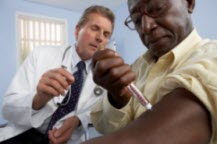- Home
- News and Announcements
- Newsletter
- Newsletter May 2010
- Home
- Tools and Resources
- Research Summaries for Consumers, Clinicians, and Policymakers
- Search for Research Summaries, Reviews, and Reports
- Research Available for Comment
- Submit a Suggestion for Research
- Submit Scientific Information Packets
- Comparative Effectiveness Research Grant and ARRA Awards
- News and Announcements
- What Is Comparative Effectiveness Research
- Who Is Involved in the Effective Health Care Program
- What Is the Effective Health Care Program
EHC Spotlight: The Diabetes Multi-Center Research Consortium

Comparative effectiveness and effectiveness research includes two equally important arms of the Effective Health Care (EHC) Program: systematic reviews of existing evidence and the generation of new scientific evidence. One of the sources for newly generated evidence within the EHC Program is the DEcIDE (Developing Evidence to Inform Decisions about Effectiveness) Network, a collection of research centers created in 2005. The Network more recently has also created several consortia to meet the needs of significant priority conditions affecting large populations such as cancer and cardiovascular disease. One of these is the Diabetes Multi-Center Research Consortium (DMCRC), which was formed in 2008. Read the full story.
New Model Employed To Prioritize Research on Uterine Fibroids
A new collaborative process for identifying and prioritizing research questions surrounding uterine fibroids was piloted for the Effective Health Care (EHC) Program of the Agency for Healthcare Research and Quality (AHRQ) in March 2010. The conference, “Research on the Comparative Management of Uterine Fibroid Disease,” held in Rockville, Maryland, on March 4th, brought together a broad group of researchers and stakeholders to explore and prioritize the unanswered questions surrounding the evaluation, management, and treatment of uterine fibroids. Their discussions produced a prioritized research agenda that will be made available to the greater community of researchers, policymakers, and consumers concerned with women’s reproductive health and uterine fibroid disease. Read the full story.
Comparative Effectiveness Review Summaries Get a New Look, Expanded Product Line
Summary products and guides from the Effective Health Care (EHC) Program will sport a new look this spring following a collaborative redesign by the John M. Eisenberg Center for Clinical Decisions and Communications Science and the Office of Communication and Knowledge Transfer at the Agency for Healthcare Research and Quality (AHRQ). Read the full story.
New Research: Clinical Effectiveness of Coronary Stents in the Elderly
A DEcIDE Network report on drug-eluting stents was published in January 2010. Using data from the American College of Cardiology’s National Cardiovascular Data Registry of 262,700 patients, the DEcIDE Network investigators found that patients who were treated with drug-eluting stents had significantly better clinical outcomes than their counterparts who were treated with bare metal stents. Read the full story.
Also in This Issue
All Issues
Editors Note:
In this issue of Comparative Effectiveness News, several of our stories focus on the ever-increasing involvement of “stakeholders,” individual citizens from medicine, industry, education, patient advocacy organizations, professional associations, and priority populations who provide context and insight to ensure that the research conducted by the Effective Health Care Program remains useful to the needs of clinicians, consumers and policymakers. Comparative Effectiveness News will continue to provide information about these efforts in future issues, so that readers can learn of the many ways in which the Program interacts collaboratively with stakeholders to make scientific medical research more relevant to clinical practice.


 E-mail Updates
E-mail Updates